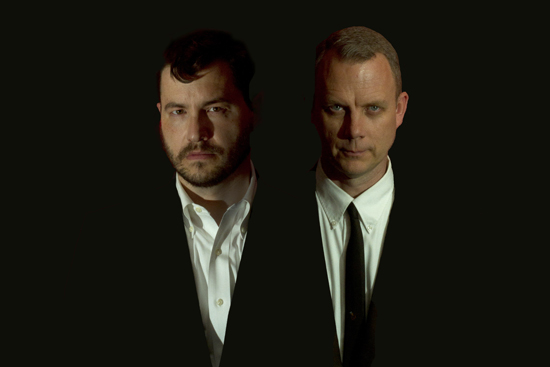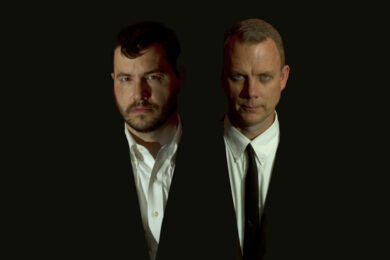Photo by James Thomas Marsh
Drew Daniel and Martin Schmidt are speaking on the phone from Baltimore the morning after the 47th Super Bowl. Last night, despite the best efforts of the New Orleans power grid, the Baltimore Ravens defeated San Francisco’s 49ers 34-31. The duo’s new home team defeating their old one has a certain neatness to it, I suggest (Daniel and Schmidt moved to Baltimore in 2007 after spending over a decade on the West Coast). "If I’d cared at all, my loyalties would’ve been so divided," jokes Schmidt.
Daniel, who was evidently a little more invested, confirms that he was supporting Baltimore this time around. Doesn’t he find the aggressive competitiveness and rampant commercialism of major league sport problematic? "Well of course it is, especially living in Baltimore – a place where people are dealing with terrible economic realities," Daniel concedes. "But counteracting that, the reality of Baltimore life is so grim that anything that harnesses that feeling of collective responsibility – that’s a good thing. I teach in a school [Johns Hopkins University] that’s full of very privileged people who are in Baltimore but don’t relate to being in Baltimore. Last night they were all out in the street chanting ‘Bal-Ti-More!, Bal-Ti-More!’ If [sport] leads to a feeling of belonging, then I don’t think that’s nonsense."
That acknowledgement of the importance of human connection, of community, is present throughout Matmos’ formidable discography, and not only in their numerous collaborative releases. From almost any other electronic musician, an album built around the sounds of cosmetic surgical procedures would likely have been a sinister affair – a grim commentary on the extreme vanity of Western consumer culture, perhaps. On the contrary, Matmos’ effort, 2001’s A Chance To Cut Is A Chance To Cure, was suffused with humour and warmth. The highly advanced form of sample bricolage that Schmidt and Daniel have perfected over 15 years may depend on quasi-academic levels of technical rigour, but at its heart is the delight to be found in the everyday; a playful valorisation of the mundane that’s in stark contrast to the accusations of "coldness" often leveled at electronic music. For Daniel, the urge to find humour is instinctive. "I think we just can’t help ourselves. When you present work there are always ways of connecting it to very dark and serious themes. But there are also ways of being honest about the ridiculousness that’s present in these situations."
The duo’s eighth album, The Marriage Of True Minds, contains a fairly healthy dose of ridiculousness. Underpinning its ten tracks is a series of "experiments" conducted on friends, students and members of the public over the course of several years. In a variation on the iconic Ganzfeld experiment – designed to test individuals for extrasensory perception – subjects would have their sight and hearing obscured while Daniel attempted to mentally project ‘the concept behind the new Matmos record’ into their minds. They would then describe any impressions that emerged: images, sounds and so forth. The transcripts of these sessions became musical scores of a sort, to be mirrored closely in sound or treated as springboards for composition. The original concept that catalysed this entire album project, however, remains confined to Daniel’s mind – even Schmidt isn’t in on the secret.
It’s tempting to see this bizarre methodology as the logical next step for a duo seemingly obsessed with setting themselves near-impossible challenges. After all, as a conceptual approach it’s so convoluted as to be verging on self-parody. I ask if there isn’t something of the megalomaniacal rock concept album about it: a quixotic attempt to realise the private vision of one man. Daniel and Schmidt seem perfectly at ease with the idea that some people will approach the project with incredulity. "I think that that reaction is a perfectly legitimate one – it’s one that we court," says Daniel. "I think the whole premise of a concept album is itself overblown. It’s applied in very racist ways, right? White intellectual narratives about elves in space are somehow a concept album, while we don’t think of a hip-hop or R&B album as a concept record, though some of them clearly are – whether it’s Marvin Gaye’s Here, My Dear or Kendrick Lamar’s good kid, m.A.A.d city."
But, as is typical of Matmos, The Marriage Of True Minds isn’t solely arch commentary. It has a heart, too. For Schmidt and Daniel, telepathy serves as a metaphor for communication of other sorts. "The longing to be understood by another person is what drives telepathy," Daniel points out. "It sounds highfalutin but it’s also a very everyday experience, that desire."
Doesn’t the album function, then, on the level of a sort of poetic failure – after all, telepathy is impossible, right? "I think you’re wrong!" laughs Daniel. "I think that we’re doing so called ‘mind reading’ all the time. There’s all sorts of everyday experiences of reading other people’s mental content – the look on their face, the way their body moves. We’re leaky bodies in a way, we give ourselves away."
So the album is a celebration as much as a critique, a fact evident in its frequently exuberant tone, from the playful faux-Beethoven portentousness of ‘Very Large Green Triangles’ to the wry deployment of transcript recordings in the gorgeous ‘In Search Of A Lost Faculty’. It’s a miracle that the duo managed to wring any enjoyment out of such a gargantuan task; built from dozens of transcripts recorded over several years, the album has had the longest gestation period of any Matmos LP. Fortunately, The Marriage Of True Minds is as beguiling as any record from the duo, careering through styles and ideas with a gleeful agility that could only be the product of a working relationship now well into its second decade.
It’s also far from being Matmos-by-numbers. The record’s creation presented a raft of new challenges for Schmidt and Daniel, not least in its heavy reliance on vocals – whether sung, spoken or growled. In the duo’s excellent 2010 RBMA lecture, Schmidt bemoaned the deadening effect that voices have on a mix, dominating the frequency spectrum and forcing other sounds into a "supporting role". So how did they come to play such a central part in the new album?
"The honest answer is that the transcripts really insisted upon it," Daniel explains. "Over and over, people in the Ganzfeld sessions heard voices, singing, chanting, and vocal sound. So there was no getting around it." The duo tackled the issue with their usual polyglot enthusiasm: a host of friends from an array of backgrounds were asked to contribute, including Dan Deacon, Dirty Projectors’ Angel Deradoorian and Clodagh Simonds of Fovea Hex. Schmidt and Daniel pitched in too, harmonising with each other for the first time ever on record – an act Daniel describes as feeling like "jumping off a bridge."
With vocals, of course, come lyrics – in this case, transcript-clippings that fluctuate between gently cryptic pronouncements (opener ‘You’) and impish genre send-ups (‘The Tunnel”s ominous techno monologue), resisting one-size-fits-all analysis. One recurrent theme, though, is the triangle – as both shape and musical instrument. Schmidt and Daniel are fairly nonplussed as to its popularity in the transcripts. "Drew says that triangles are trendy right now", says Schmidt. "I don’t have a finger on the pulse of trends as well as he does – to me that’s sort of like saying that oxygen is trendy."
Perhaps triangles were a part of Daniel’s original concept? "I can neither confirm nor deny that," he demurs. "But I will say, without giving too much away – and I do that in order to preserve a permanency about the project – there’s a least one song on this record whose contents very directly reflect what I sent."
And so the puzzle of this record – part crackpot scientific experiment, part circuitous poetic statement – persists. But The Marriage Of True Minds is more than just an enigma to be chewed over. It’s also a remarkably full, vibrant record, and one that rewards absorption in its sounds as much as in the unique conditions of its creation. The closing track, an absurd doom-metal cover of The Buzzcocks’ ‘ESP’, suddenly changes tack part-way through, its hosts of guitars twanging out the original’s central riff with a raucous abandon that practically overflows with joy. It’s almost as if, after so many years’ work, the duo are expressing their relief at being able to lay the record to rest. "That track took so long to construct, and there were so many different versions and variants and Frankenstein’s monsters made out of different songs," says Daniel. "I will confess that I felt really, really absurdly happy when we finally had the mix we wanted. It sounds smug, but it shouldn’t, it’s just how you feel when you’ve been inside a project for years and then you finally feel that little ‘click in the lock’ of closure. It usually lasts for about 20 minutes, and then you’re thinking about lunch."



